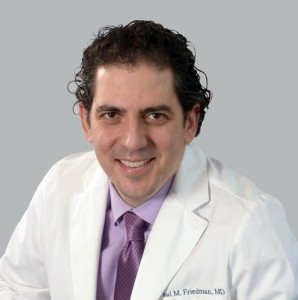
Dr. Paul Friedman, MD
Physician
Dermatology
Specialty
Cosmetic Dermatology,
Dermatologic Surgery
Medical Expertise of Dr. Paul Friedman, MD
Paul M. Friedman, MD, is a board-dertified Houston Dermatologist and the Director of Dermatology & Laser Surgery Center
Dr. Friedman is also a practicing dermatologist at the Laser & Skin Surgery Center in New York.
Dr. Friedman is a leading authority on skin rejuvenation and minimally invasive cosmetic procedures, as well as an experienced researcher and physician in the field of dermatologic surgery.
Dr. Friedman’s expertise has been recognized with several awards, including the prestigious 2019 Leon Goldman Memorial Award from the American Society for Laser Medicine & Surgery (ASLMS).
Dr. Friedman’s professional accomplishments include serving on the ASLMS Board of Directors and as Co-Chair for the Cutaneous Laser Surgery Section of several annual ASLMS conferences, and as a current member of the Editorial Board of the Journal of Dermatologic Surgery.
Dr. Friedman is also a practicing dermatologist at the Laser & Skin Surgery Center in New York.
Dr. Friedman is a leading authority on skin rejuvenation and minimally invasive cosmetic procedures, as well as an experienced researcher and physician in the field of dermatologic surgery.
Dr. Friedman’s expertise has been recognized with several awards, including the prestigious 2019 Leon Goldman Memorial Award from the American Society for Laser Medicine & Surgery (ASLMS).
Dr. Friedman’s professional accomplishments include serving on the ASLMS Board of Directors and as Co-Chair for the Cutaneous Laser Surgery Section of several annual ASLMS conferences, and as a current member of the Editorial Board of the Journal of Dermatologic Surgery.
Procedures & Services
Patient Education Resources
Can I switch the biologic medications I’m using to treat my psoriasis?
Yes, you can switch biologic medications for psoriasis if one is not working effectively. Biologic medications are a class of drugs that target specific parts of the immune system that are involved in...
Yes, you can switch biologic medications for psoriasis if one is not working effectively. Biologic medications are a class of drugs that target specific parts of the immune system that are involved in...
How do biologics work to treat my psoriasis?
Biologics are a class of medications that are used to treat moderate to severe psoriasis. They are typically used when other treatments, such as topical creams and light therapy, have not been effecti...
Biologics are a class of medications that are used to treat moderate to severe psoriasis. They are typically used when other treatments, such as topical creams and light therapy, have not been effecti...
What are some basic acne skin care tips?
Here are some basic acne skin care tips that may help to reduce the appearance and severity of acne:Cleanse your skin gently: Use a mild, non-abrasive cleanser to wash your face twice a day. Avoid usi...
Here are some basic acne skin care tips that may help to reduce the appearance and severity of acne:Cleanse your skin gently: Use a mild, non-abrasive cleanser to wash your face twice a day. Avoid usi...
What is the treatment for skin cancer?
Treatment for skin cancer will depend on the type and stage of the cancer, as well as the location and size of the tumor, and the patient's overall health. The main treatment options for skin canc...
Treatment for skin cancer will depend on the type and stage of the cancer, as well as the location and size of the tumor, and the patient's overall health. The main treatment options for skin canc...
What medications are used to treat acne?
There are several medications that can be used to treat acne, including:Topical retinoids (e.g. tretinoin, adapalene)Topical antibiotics (e.g. clindamycin, erythromycin)Topical benzoyl peroxideOral an...
There are several medications that can be used to treat acne, including:Topical retinoids (e.g. tretinoin, adapalene)Topical antibiotics (e.g. clindamycin, erythromycin)Topical benzoyl peroxideOral an...
Education & Training
- Residency: NYU School of Medicine
- Internship: Washington University - Barnes-Jewish Hospital
- Medical School: University of Tennessee College of Medicine

